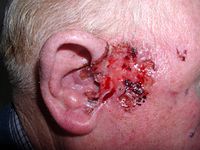
Photo from wikipedia
β-Ionone, the end ring analog of β-carotenoids, has been proven to have an antitumor effect in a variety of cancers. In this study, we investigated the impact of β-ionone on… Click to show full abstract
β-Ionone, the end ring analog of β-carotenoids, has been proven to have an antitumor effect in a variety of cancers. In this study, we investigated the impact of β-ionone on renal cell carcinoma (RCC) cell lines (786-O and ACHN) using colony formation assays, flow cytometry analysis, and western blot analysis. We found that β-ionone effectively inhibited the proliferation of RCC cells in vitro, which was also confirmed in a xenograft model. Moreover, we found that β-ionone could induce autophagy, as indicated by LC3 puncta in 786-O and ACHN cell lines and the expression of LC3 in β-ionone-treated RCC cells. To further explore the underlying mechanism, we assessed liver kinase B1/AMP-activated protein kinase (LKB1/AMPK) signaling pathway activity, and the results showed that β-ionone inhibited the proliferation of RCC cells by inducing autophagy via the LKB1/AMPK signaling pathway. In summary, our findings provide a new therapeutic strategy of β-ionone-induced autophagy in RCC.
Journal Title: Journal of biochemical and molecular toxicology
Year Published: 2023
Link to full text (if available)
Share on Social Media: Sign Up to like & get
recommendations!